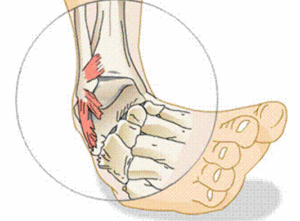 Sprained ankles are the most common injury in a variety of different sports including football, volleyball and tennis. It occurs more often in basketball than in any of these other sports. In a study conducted by Drakos et al (2010) identifying the different injuries sustained in the National Basketball Association (NBA) over a 17-year period, ankle injuries were found to be the most common in occurrence and one of the top reasons athletes had to sit out of games.
Sprained ankles are the most common injury in a variety of different sports including football, volleyball and tennis. It occurs more often in basketball than in any of these other sports. In a study conducted by Drakos et al (2010) identifying the different injuries sustained in the National Basketball Association (NBA) over a 17-year period, ankle injuries were found to be the most common in occurrence and one of the top reasons athletes had to sit out of games.
Ankle sprains involve the stretching or tearing of at least one of the ligaments around the ankle. In basketball this often happens when the player rolls over the outside of his or her ankle causing what is typically referred to as a lateral ankle sprain. The lateral ankle sprain accounted for a total of 13.2% of all injuries in the research conducted by Drakos et al (2010).
Ankle sprains are diagnosed and split by the degree of severity; from a stable ankle with a stretched ligament (grade 1), a slightly unstable ankle with a partially torn ligament (grade 2), to a thoroughly unstable one with a completely torn ligament (Grade 3). Symptoms range from mild to extreme pain, limited movement to extreme instability and difficulty in walking, swelling and bruising.
Depending on the severity of the sprain treatment differs. Usually standard initial treatment includes rest, ice packs, pain killers and swelling reducing drugs, elastic wrap to limit swelling in the initial stages and an ankle brace to offer the ankle some extra support. As the ankle begins to heal, part of the treatment process includes specific ankle targeted exercises, and general exercises to gradually bring back full range of motion and ankle strength so the injured basket-baller can resume match play.
To give a specific recent example, Matt Barnes, basketball player for the Golden State Warriors, sprained his right ankle in the first half of a game against the Pelicans on the 8th of April. Since then he has not been used on the court, but he has been able to join in some of the team’s practice on the 24th of April, giving him a solid 2 weeks of rest for his sprained ankle. He will gradually be eased back into routine training to assure his ankle has fully healed and the surrounding muscles and ligaments have a chance to properly mend.
How to Prevent it?
A possible preventative tool to avoid getting a sprained ankle as easily is the use of ankle support devices (ASD). The use of ASDs was analysed amongst recreational, high-school, and university basketball players in research done by Cusimano et al (2013). The study found that players who had previously suffered from ankle injuries, and whose coaches enforced an ASD policy were more likely to wear ASDs than those who did not. This research concluded that basketball players at this level need to be educated on the severity of ankle injuries, and the benefits of the ASDs as it goes a long way to protect the ankle from sprain injuries. Reading articles such as this one, or looking at case studies of basket-ballers who have had to miss out on whole seasons in order to give their ankle rest would go a long way in that regard.
Conclusion
Basketball is a fast moving game which includes a lot of sudden direction changes. As such sprained ankles are a common occurrence in competitive as well as non-competitive circles. Considering this, more research should go into possible preventative methods and ankle stabilising equipment, as well as the educating of regular non-professional basketball players who are part of a team on the benefits of these devices as part of their game.
References
Cusimano, M., Faress, A., Luong, W., Amin, K., Eid, J., Abdelshaheed, T. and Russell, K. (2013). Factors Affecting Ankle Support Device Usage in Young Basketball Players. Journal of Clinical Medicine, 2(2), pp.22-31.
Drakos, M., Domb, B., Starkey, C., Callahan, L. and Allen, A. (2010). Injury in the National Basketball Association: A 17-Year Overview. Sports Health: A Multidisciplinary Approach.
Core Performance. (2017). How to Heal an Ankle Sprain. [online] Available at: http://www.coreperformance.com/knowledge/injury-pain/ankle-sprain.html [Accessed 29 Apr. 2020].
Rotoworld.com. (2017). Matt Barnes – Golden State Warriors – 2025 Player Profile – Rotoworld.com. [online] Available at: http://www.rotoworld.com/player/nba/892/matt-barnes [Accessed 29 Apr. 2020].




